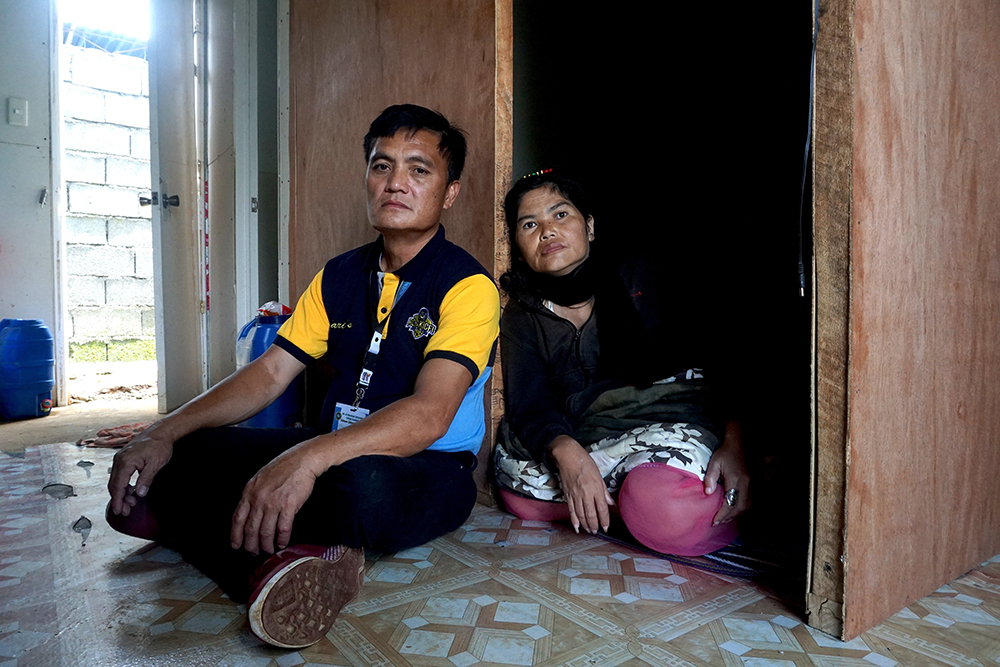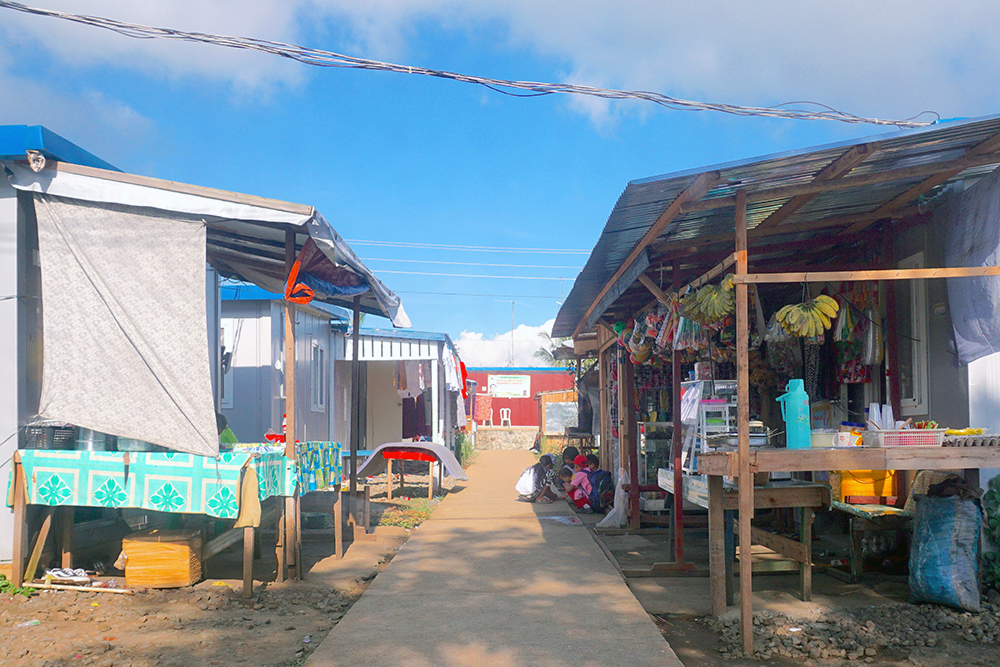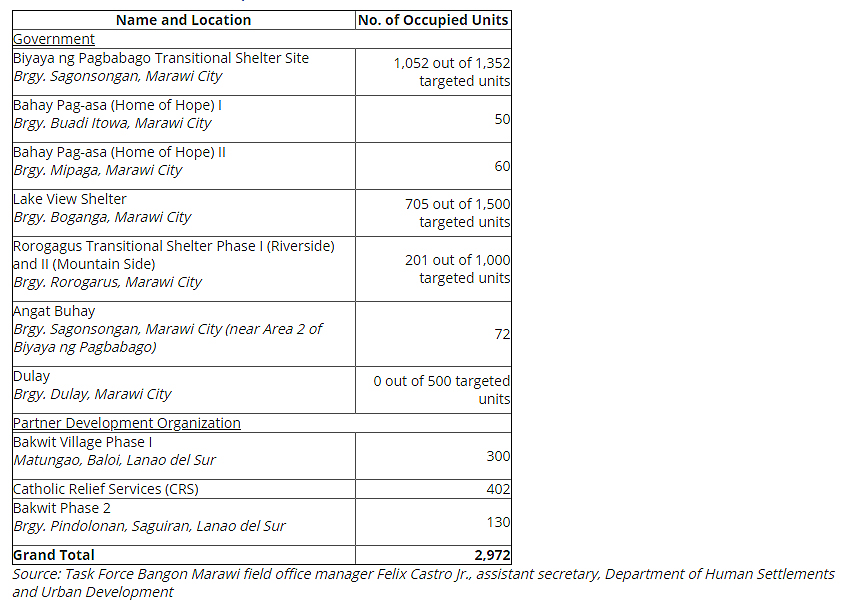Life doubly harder in Marawi shelters as coronavirus grounds aid groups
Marawi residents find it hard to follow precautions against the novel coronavirus disease when relief goods are limited and water trucks are reducing trips. Local authorities say they do not have enough resources to feed the people for an extended period. They need outside help.
BY CARMELA FONBUENA/PCIJ
RESIDENTS trooped to the small mosque at Area 1 Temporary Shelter in Marawi City’s Sagonsongan village for the Friday prayers on March 27. They were aware they were violating instructions from the barangay chairman to observe physical distancing, a precaution against the highly contagious novel coronavirus disease that has killed at least three fellow Maranaos.
“They prayed side by side, but they were all wearing masks,” said Saipoding Mariga Mangotara, one of about 17,000 Marawi residents still living in shelters three years after the siege that flattened the city center and destroyed their homes.
The mosque-goers had a plea to Allah. They prayed for the virus to go away so that quarantine measures, which had made life even more difficult, would end.
The disease has killed over 50,000 and infected more than a million people around the world by the first week of April. The Philippines confirmed more than a hundred deaths and over 3,000 infections during the same period, but experts said the country’s poor testing rate means there are thousands more undetected cases.
Marawi City Mayor Majul Gandamra ordered all village chiefs to strictly impose “enhanced community quarantine” measures on March 19, grounding Mangotara and his neighbors inside their 24-square-meter homes.
Quarantine measures such as military and police checkpoints have hurt people’s livelihoods, including those of about 1,500 tricycle drivers and an undetermined number of “pedicab traders” who earned their living going around barangays to sell fish and vegetables.
They’re no longer allowed to go outside the shelters to earn money to buy food. Those who do have money have found it difficult to pass through checkpoints to reach the markets. There are sari-sari stores, but residents are afraid the owners will soon shut them down to keep the supply for their own families.
“We’re like chickens in a coop. We can’t get out. It’s hard because we’re running out of food. We don’t have income. We can’t buy,” said Mangotara.
Residents at the shelter got food packs from the local government, but a few kilos of rice and canned goods would last only a few days. Private donations, which have helped them get by since their displacement in 2017, have arrived in trickles since the quarantine. Even feeding programs have stopped because of crowding.

No more fieldwork
The quarantine has grounded most, if not all, aid and development groups operating in Marawi City, even if they’re exempted from the lockdown measures along with health workers and other emergency front liners. Task Force Bangon Marawi field office manager Felix Castro Jr., who oversees activities in the shelters, said there were no requests from the usual groups and foundations to visit the shelters lately.
Marawi residents have been asking for assistance but it’s hard for everyone to move, said Charlito Manlupig, chairman of Balay Mindanaw Foundation, an organization helping communities in Marawi and other parts of Mindanao.
“There’s zero movement among the different aid groups, as far as I know. Almost all partner international agencies have pulled out. No one is allowed to do field work,” Manlupig said.
It’s a challenge for many temporary shelters, evacuation sites, and vulnerable communities throughout the Philippines that rely on aid groups and foundations.
“I can confirm that though not ended, most of our field activities have been significantly reduced due to the pandemic,” said Allison Lopez, spokesperson for the local chapter of the International Committee of the Red Cross (ICRC).
Lopez said the ICRC felt it was important to take precautionary measures to make sure its staff would not inadvertently bring the virus to vulnerable communities.
That meant postponing projects such as cash-for-work programs in Lanao del Sur and Zamboanga del Sur, as well as the distribution of food and household items to displaced people in Agusan del Sur. “These three projects alone cover 1,000 people,” said Lopez.
It’s the same at Oxfam Philippines. Humanitarian manager Rhoda Avila said they, too, have suspended field work for two weeks since the lockdown.
Oxfam was able to install handwashing facilities in some areas before the lockdown, but was forced to postpone a project to install water pump facilities in a conflict community in Maguindanao.

File photo: Carmela Fonbuena
Scared of disease and hunger
Authorities have vowed to protect the Marawi shelters in case of a wider outbreak. Asnin Pendatun, cabinet secretary of the Bangsamoro Autonomous Region for Muslim Mindanao, said they were closely watching Lanao del Sur, where Marawi City is located, because it had the most number of COVID-19 infections.
All six cases in the region as of March 31 were residents of Marawi City and Lanao del Sur. Three elderly cases have died, two were admitted to the Amai Pakpak Medical Center in Marawi, and one was quarantined at home.

But authorities were still tracking attendees of a religious gathering in Malaysia from Feb. 27 to March 1, which was linked to clusters of coronavirus cases in Malaysia, Singapore, and Brunei, Pendatun said. There were at least 10 attendees from Lanao del Sur.
Zia Alonto Adiong, Bangsamoro parliament member and spokesperson for the Lanao del Sur COVID-19 task force, said they were wary of undetected cases in the province. “The scarcity of test kits is a problem. We don’t know the exact number of cases, who they are, and where they are. We don’t have the data. It definitely affects the degree of response of the local government units,” he said.
Adiong was worried about asymptomatic cases, too. “They might look healthy but they are carriers of the disease. There has to be mass testing,” he said.
Displaced residents are equally scared.
In March, occupants of Bahay Pag-asa shelters in Buadi Itowa village became agitated. A resident had just returned from Metro Manila – the epicenter of coronavirus outbreak in the country – and developed a fever.
People knew she had been to Greenhills Shopping Center in San Juan, the site of the first known cases of local transmission, and feared she had brought the virus to their community. Panicked residents sent her to Amai Pakpak Medical Center. She later tested negative.
“We were really scared. We thought she caught the disease. There was a misunderstanding. We were all relieved to learn she had tested negative,” said Johanna Abdelfattah, a resident who also serves as community organizer for Balay Mindanaw Foundation.
Hunger is a force much stronger than the virus, however. Two weeks into the quarantine, fears of getting infected were overshadowed by a problem literally closer to the gut – how to get food on the table.
Some have turned fatalistic. “People here say we will die when Allah says it’s our time to die,” said Mangotara.
LGU’s burden
To make the quarantine work, it’s important to guarantee residents they will get food, water, medicines and other necessities, Balay Mindanaw area manager Charmaine Mae Dagapioso Baconga said.
“The people are scared. The people are bored. It’s hard to control their movements. Some people are complaining because it’s really been hard. They’re afraid to get the disease, but they also worry about their livelihood,” said Baconga.
Mayor Gandamra said the city would not be able to feed its people for an extended period without outside help.
“Definitely, we cannot sustain the distribution of food packs if coronavirus drags on and the quarantine measures are extended. We are not the same as the cities in Metro Manila. We are not like Quezon City that has billions of pesos in income,” he said.
Transitional Shelter Sites, as of April 2, 2020

For a population of about 200,000 people, Marawi City only has P2.5 million in its calamity fund each month, which translates to about P870,000 in emergency funds it can spend for coronavirus response. “We’ve been spending way beyond [our budget]. Fortunately, we still have savings,” Gandamra said.
The Bangsamoro regional government has sent food packs to indigents and persons under investigation (PUIs) and persons under monitoring (PUMs) for the disease, hoping to keep them in their homes. “We are coordinating with the province to be able to deliver food packs in batches,” said Pendatun.
As for the national government, the Department of Budget and Management said on April 2 that P100 billion had been released for the distribution of cash aid to poor families all over the country.
Gandamra said city officials were still checking the guidelines to see if residents in the shelters were qualified, as not all of them were beneficiaries of cash transfers under the Pantawid Pamilyang Pilipino Program.
Gandamra and Adiong were counting on private aid groups to find a way to continue assistance to displaced residents of Marawi.
Rice, water supply, medicines
The mayor hopes donors prioritize rice, as fears of a shortage have made it difficult to stockpile on the staple.
“There are provinces that do not want other local government units to buy from them. They are keeping their supply for their own people. We understand they’re protecting themselves, but there will be areas that will not have rice if the situation gets worse,” Gandamra said.
Water supply was always a problem, but coronavirus has made it worse. Water trucks that used to fill up their tanks were reducing trips lately, making it harder for residents to follow hygiene rules and handwashing instructions, Mangotara and Abdelfattah said.
Castro said there was a temporary disruption because the Marawi task force had to issue clearances to let truck drivers pass through checkpoints in Iligan, where many of them lived. He said water distribution would continue, but admitted that supply was not always enough.
There are water pumps in Sagonsongan and Bahay Pag-asa, but Abdelfattah said the queues were often long and supply was unreliable. The pumps broke down frequently because of overuse, she said.
While rains have allowed residents to collect water, they are also a cause of illnesses. “The sun is out one minute, then it rains the next. It’s hot, then cold. People have asked for medicines at the first sign of colds or fever because they’re afraid it might be coronavirus. The barangay has run out of supply,” said Abdelfattah.
Now that dry season has arrived, water pumps are badly needed as there are no rains to augment water supply. Balay Mindanao was unable to transport water pump facilities for communal gardens at Bahay Pag-asa because of the suspension of domestic air travel, Abdelfattah said.
Abdelfattah knew her neighbors envied her because she had a job at the foundation. “I tell them I will not hesitate if it’s in my power to make their lives better. But I also have to be careful with what I say to them because I cannot give them false hopes. I can only do so much right now,” she said.
Three years since the siege, displaced Marawi residents were still struggling to rise again. Coronavirus is poised to set back gains they have made.
“Coronavirus has made our lives doubly harder… I hope none of us will get it. I cannot imagine what’s going to happen to us.”
= = = = = = =
Carmela Fonbuena is a freelance journalist based in Manila. Follow her on Twitter (@carmelafonbuena) or email her at [email protected] for comments.
— PCIJ
